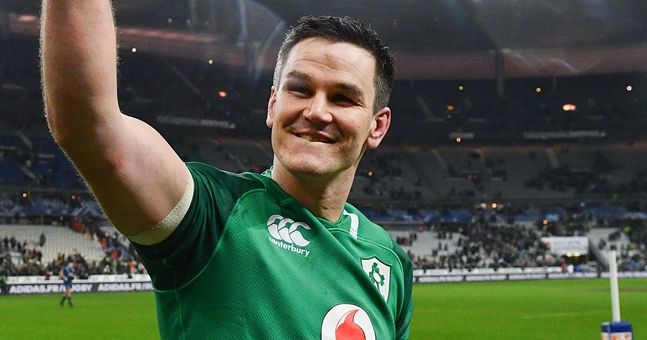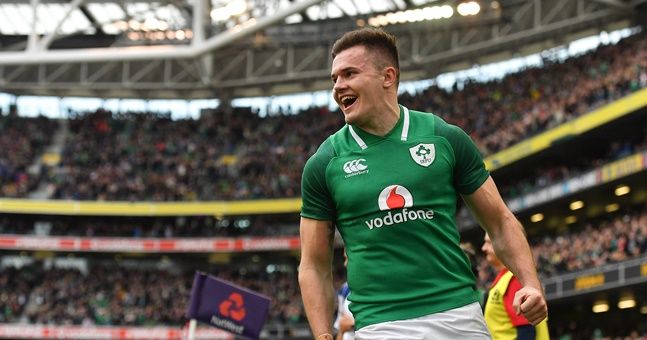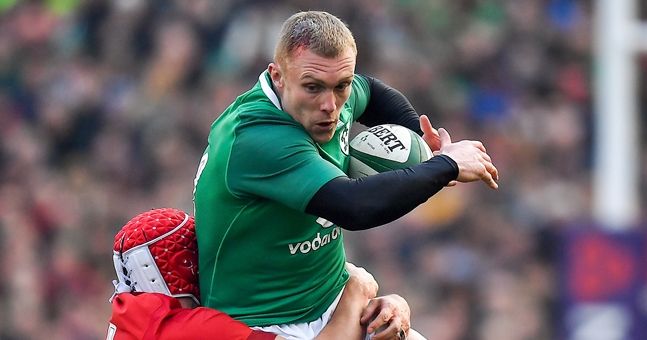

Share
19th March 2018
11:35am GMT

 PLD: 5 TRY: 0 CON: 13 DG: 1 PEN: 5 PTS: 44
For as impressive as Ireland were against England in the first-half on Saturday, and they were really, really good, the Grand Slam simply doesn't happen if Johnny Sexton steers his 45 metre drop goal wide of the posts in Paris.
But, as fate would have it, after 41 phases and through a sea of tired bodies around him, Conor Murray passed the ball back to Sexton who nailed his effort with the game - and Ireland's Grand Slam hopes - on the line.
You could argue that Sexton put Ireland in that position with missed goal kicks, and you could also argue that he missed a number of straightforward shots at goal throughout the championship, but could you argue that he was anything other than stellar through the course of the championship? (Missed kicks withstanding)
I was convinced I'd seen the best of Sexton during the 2011 Heineken Cup, and then reassessed the matter again on the 2013 British & Irish Lions tour of Australia, but five years on and he's arguably playing better rugby than he ever has before.
His vision, his ball carrying, his moments of genius - the cross kick to Earls, the chip kick against Scotland, the backpedaling and his defence on Huw Jones - and his perseverance put the 2018 Six Nations up there as the best single tournament we've seen from Sexton, even if that's not exactly reflected in his stats line.
He's been sensational this season and remains Ireland's most important player alongside Conor Murray.
Conor Murray
PLD: 5 TRY: 0 CON: 13 DG: 1 PEN: 5 PTS: 44
For as impressive as Ireland were against England in the first-half on Saturday, and they were really, really good, the Grand Slam simply doesn't happen if Johnny Sexton steers his 45 metre drop goal wide of the posts in Paris.
But, as fate would have it, after 41 phases and through a sea of tired bodies around him, Conor Murray passed the ball back to Sexton who nailed his effort with the game - and Ireland's Grand Slam hopes - on the line.
You could argue that Sexton put Ireland in that position with missed goal kicks, and you could also argue that he missed a number of straightforward shots at goal throughout the championship, but could you argue that he was anything other than stellar through the course of the championship? (Missed kicks withstanding)
I was convinced I'd seen the best of Sexton during the 2011 Heineken Cup, and then reassessed the matter again on the 2013 British & Irish Lions tour of Australia, but five years on and he's arguably playing better rugby than he ever has before.
His vision, his ball carrying, his moments of genius - the cross kick to Earls, the chip kick against Scotland, the backpedaling and his defence on Huw Jones - and his perseverance put the 2018 Six Nations up there as the best single tournament we've seen from Sexton, even if that's not exactly reflected in his stats line.
He's been sensational this season and remains Ireland's most important player alongside Conor Murray.
Conor Murray
 PLD: 5 TRY: 2 CON: 0 DG: 0 PEN: 2 PTS: 16
Whether you deem Johnny Sexton a more important player to the Irish team than Conor Murray, or whether you think that Murray is a more important cog in the Irish cause than Sexton, it's splitting hairs to rank one above the other and probably depends on how you view the relative competition behind them (i.e. Carbery & Keatley v Marmion & McGrath).
It is kind of ironic that Ireland's depth is weakest in the two positions that their best players occupy, but maybe that's in part to just how good Murray and Sexton are together.
They have made significant strides since their first Six Nations as a halves partnership in 2012, and while Sexton has had multiple points throughout his career were you were convinced he had reached his apex as a player, Murray is undoubtedly at the peak of his powers this season.
The Munster scrum-half was a standout for the British & Irish Lions in their drawn series with New Zealand last summer and he's taken that form into this season and this year's championship.
His tries against Scotland and Italy showed his power from the base of the ruck, his penalties against England and Wales showed his versatility, his box kicking and sniping were a constant threat and his support play was great too.
Murray and Tadhg Furlong are probably the only two players in this Irish team that can make legitimate claims that they are the best players in their position in the world right now, and with regards to Furlong, and particularly with Murray given his nomination, they can also make a pretty good case that they've been the best player in this year's championship.
[If poll does not appear click here].
Jacob Stockdale
PLD: 5 TRY: 2 CON: 0 DG: 0 PEN: 2 PTS: 16
Whether you deem Johnny Sexton a more important player to the Irish team than Conor Murray, or whether you think that Murray is a more important cog in the Irish cause than Sexton, it's splitting hairs to rank one above the other and probably depends on how you view the relative competition behind them (i.e. Carbery & Keatley v Marmion & McGrath).
It is kind of ironic that Ireland's depth is weakest in the two positions that their best players occupy, but maybe that's in part to just how good Murray and Sexton are together.
They have made significant strides since their first Six Nations as a halves partnership in 2012, and while Sexton has had multiple points throughout his career were you were convinced he had reached his apex as a player, Murray is undoubtedly at the peak of his powers this season.
The Munster scrum-half was a standout for the British & Irish Lions in their drawn series with New Zealand last summer and he's taken that form into this season and this year's championship.
His tries against Scotland and Italy showed his power from the base of the ruck, his penalties against England and Wales showed his versatility, his box kicking and sniping were a constant threat and his support play was great too.
Murray and Tadhg Furlong are probably the only two players in this Irish team that can make legitimate claims that they are the best players in their position in the world right now, and with regards to Furlong, and particularly with Murray given his nomination, they can also make a pretty good case that they've been the best player in this year's championship.
[If poll does not appear click here].
Jacob Stockdale
 PLD: 5 TRY: 7 CON: 0 DG: 0 PEN: 0 PTS: 35.
Played five games and scored seven tries. I could probably leave it there if I wanted to and those seven words would probably carry more weight as the seven-hundred odd words that preceded that sentence, but for a player as good as Stockdale, and particularly for as young as he is, he deserves more.
Against England, the Ulster winger became the first player in the history of the Six Nations to score seven tries when he collected his own chip kick to score what was effectively the match ending try.
https://www.youtube.com/watch?v=P7j-LRlY4Qs
The Ireland flier was just one try short of the all-time record shared by England’s Cyril Lowe (1914) and Scotland’s Ian Smith (1925), while there are only 18 men in history who have scored more Test tries for Ireland than him.
He's 21, he has nine caps and it's his first Six Nations campaign.
He's 21, he has nine caps and it's his first Six Nations campaign.
His history breaking feat makes him a frontrunner for this year's award and an annual threat for this gong going forward.
Keith Earls
PLD: 5 TRY: 7 CON: 0 DG: 0 PEN: 0 PTS: 35.
Played five games and scored seven tries. I could probably leave it there if I wanted to and those seven words would probably carry more weight as the seven-hundred odd words that preceded that sentence, but for a player as good as Stockdale, and particularly for as young as he is, he deserves more.
Against England, the Ulster winger became the first player in the history of the Six Nations to score seven tries when he collected his own chip kick to score what was effectively the match ending try.
https://www.youtube.com/watch?v=P7j-LRlY4Qs
The Ireland flier was just one try short of the all-time record shared by England’s Cyril Lowe (1914) and Scotland’s Ian Smith (1925), while there are only 18 men in history who have scored more Test tries for Ireland than him.
He's 21, he has nine caps and it's his first Six Nations campaign.
He's 21, he has nine caps and it's his first Six Nations campaign.
His history breaking feat makes him a frontrunner for this year's award and an annual threat for this gong going forward.
Keith Earls
 PLD: 5 TRY: 1 CON: 0 DG: 0 PEN: 0 PTS: 5.
Earls scored three tries in five games last year but looked a much better player in this year's championship.
He came into the tournament off of a great run of games with Munster and carried that form right the way through the championship as he snatched cross kicks from the air against France, hauled down breakaway wingers against Italy and danced his way past Wales en route to a Dan Leavy second-half try.
He endured a rare off day against Scotland in round four, which may be held against him given the standard of competition here, but a couple of uncharacteristic errors in the first-half against the Scots aside, Earls was outstanding this season and is playing the best rugby of his career nearly a decade after earning a call up to the 2009 Lions tour of South Africa.
He was the 24th man for the 2009 Grand Slam and missed out on both of the 2014 and 2015 Six Nations wins, where he didn't play a game for Ireland for over two years after rupturing his AC joint in Ireland’s defeat to Italy in Rome in March 2013.
Earls missed out on three major Irish successes before but was not going to be denied for a fourth time.
In an Irish quartet contending for Player of the Championship honours maybe Earls is lucky number four, but if he's not, he can at least stand over a fantastic campaign and a long awaited championship medal. Good things come to those who wait.
PLD: 5 TRY: 1 CON: 0 DG: 0 PEN: 0 PTS: 5.
Earls scored three tries in five games last year but looked a much better player in this year's championship.
He came into the tournament off of a great run of games with Munster and carried that form right the way through the championship as he snatched cross kicks from the air against France, hauled down breakaway wingers against Italy and danced his way past Wales en route to a Dan Leavy second-half try.
He endured a rare off day against Scotland in round four, which may be held against him given the standard of competition here, but a couple of uncharacteristic errors in the first-half against the Scots aside, Earls was outstanding this season and is playing the best rugby of his career nearly a decade after earning a call up to the 2009 Lions tour of South Africa.
He was the 24th man for the 2009 Grand Slam and missed out on both of the 2014 and 2015 Six Nations wins, where he didn't play a game for Ireland for over two years after rupturing his AC joint in Ireland’s defeat to Italy in Rome in March 2013.
Earls missed out on three major Irish successes before but was not going to be denied for a fourth time.
In an Irish quartet contending for Player of the Championship honours maybe Earls is lucky number four, but if he's not, he can at least stand over a fantastic campaign and a long awaited championship medal. Good things come to those who wait.
Explore more on these topics: